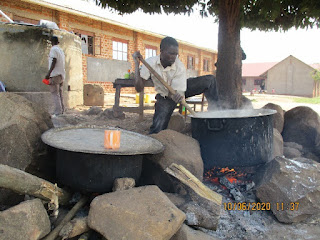UNEP’s Adaptation Gap Report (2020) defines Adaptation as reducing countries’ and communities’ vulnerability to climate change by increasing their ability to absorb impacts and remain resilient – is a key pillar of the Paris Agreement. The Agreement requires all of its signatories to plan and implement adaptation measures through national adaptation plans, studies, monitoring of climate change effects and investment in a green future.
In accordance with the principle of “common but differentiated responsibility and respective capabilities” set out in the UNFCCC, developed country Parties are to provide financial resources to assist developing country Parties in implementing the objectives of the UNFCCC. The Paris Agreement reaffirms the obligations of developed countries, while for the first time also encouraging voluntary contributions by other Parties. Developed country Parties should also continue to take the lead in mobilizing climate finance from a wide variety of sources, instruments and channels, noting the significant role of public funds, through a variety of actions, including supporting country-driven strategies, and taking into account the needs and priorities of developing country Parties. Such mobilization of climate finance should represent a progression beyond previous efforts.
In 2009, rich and developed countries committed to setting aside US$100 billion a year to support developing countries to protect themselves against climate change. Initiatives that track this money show that developed countries have since set aside much less than that. But without sufficient finance to developing countries, particularly those suffering the worst impacts of the climate crisis, it is simply impossible to develop a spirit of global cooperation.
Just as we are still grappling with a universal definition of climate finance (it is hard to estimate the actual size of this because money that does not address climate change sometimes gets reported as being part), there seems to be a discourse to prop up adaptation finance as the focus of COP26. As one senior COP26 organizer has recently been quoted as saying, ‘Adaptation financing will need good clarification from the regions fronting it. It must be in the SMART format, how measurable it is,..’
This to me seems to be an attempt to simplify a long-standing and complicated issue that begs global attention, but treated as a piecemeal political score at COP26. Without the broader consideration of climate finance, the broader need of climate action by developing countries is ‘orphaned’. This is because, while SMART adaptation financing is laudable, it could undermine the long-term approach needed to address climate change, conceals discussions on historical responsibility to climate change (including climate justice and reparations) and might zero down to a closed system with linear logic that is neither people-centred nor feasible to counter the current global climate change challenge.
In my view it is climate finance that should be the focus at COP26, with candid discussions on:
- Securing a clear delivery plan for the promised (belated) adaptation and mitigation commitments (USD 100 billion per year) via the UNFCCC mandated channels (Adaptation Fund, GCF, GEF) and other sources.
- More options for direct climate finance access via GCF and other sources, to small-scale climate adaptation and mitigation projects for communities on the ground (local solutions) where it is needed the most.
- Increasing share of climate finance to address gender equality objectives to ensure that it reaches women that are suffering the worst impacts of the climate crisis.
- Improving transparency on what is being provided and reaching developing countries, as well as better predictability and accessibility of this finance is vital. In particular, pledged mitigation and adaptation funds must reach all developing countries.
- Addressing structural barriers to accessibility and responsiveness to the needs and rights of women, children and young people, Indigenous peoples, people with disabilities, and other marginalized groups.
- Operationalization of an inclusive and transparent Santiago Network on Loss and Damage (SNLD), which must be driven by Parties, and centred upon the needs of the vulnerable developing countries and communities.


